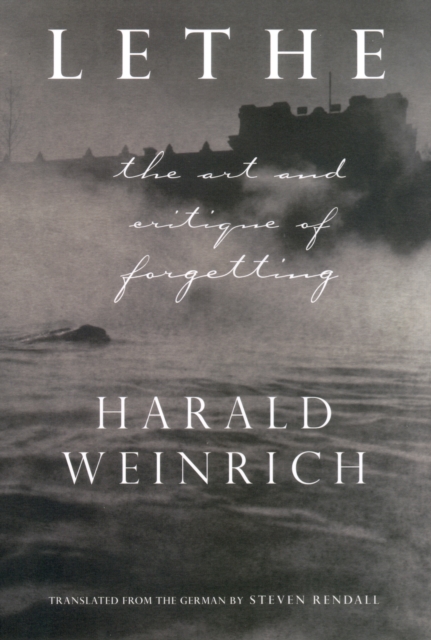Lethe: The Art and Critique of Forgetting

Lethe: The Art and Critique of Forgetting
"Our daily encounters with forgetting have not taught us enough about how much power it exercises over our lives, what reflections and feelings it evokes in different individuals, how even art and science presuppose--with sympathy or antipathy--forgetting, and finally what political and cultural barriers can be erected against forgetting when it cannot be reconciled with what is right and moral.... We find that cultural history provides a helpful perspective in which the value of the art of forgetting emerges.... That is the subject this book (through which flows Lethe, the meandering stream of forgetfulness) will try to represent and discuss by means of many concrete examples, taken primarily from literature."--from LetheLethe is an exploration of the art of forgetting--as the counterpart of the rhetorical art of memory--in Western culture from the Greeks to the present. It offers penetrating analyses of works by, among others, Augustine, Bellow, Borges, Casanova, Celan, Cervantes, Dante, Descartes, Freud, Goethe, Homer, Kant, Kleist, Levi, Locke, Mallarmé, Montaigne, Nietzsche, Ovid, Pirandello, Plato, Proust, Rabelais, Rousseau, Sartre, and Wiesel. What emerges is a general view of forgetting that combines a recognition of its necessity and inevitability with a critique of forgetting (particularly in the case of the Holocaust) and the need to combat it. Harald Weinrich's epilogue considers forgetting in the present age of information overflow, particularly in the area of the natural sciences.This magisterial book was first published in German in 1997 and has already been translated into French, Hungarian, Italian, Japanese, Polish, Portuguese, and Spanish; a Korean translation is in the works. This is the first of Weinrich's books to be translated into English and will be welcomed by scholars and students of literature, intellectual and cultural historians, classicists, historians of philosophy, and other philosophers with literary interests. The range of the book is astonishing. In Steven Rendall's skillful and fluent translation, its readability is noteworthy.
PRP: 396.49 Lei
Acesta este Prețul Recomandat de Producător. Prețul de vânzare al produsului este afișat mai jos.
317.19Lei
317.19Lei
396.49 LeiLivrare in 2-4 saptamani
Descrierea produsului
"Our daily encounters with forgetting have not taught us enough about how much power it exercises over our lives, what reflections and feelings it evokes in different individuals, how even art and science presuppose--with sympathy or antipathy--forgetting, and finally what political and cultural barriers can be erected against forgetting when it cannot be reconciled with what is right and moral.... We find that cultural history provides a helpful perspective in which the value of the art of forgetting emerges.... That is the subject this book (through which flows Lethe, the meandering stream of forgetfulness) will try to represent and discuss by means of many concrete examples, taken primarily from literature."--from LetheLethe is an exploration of the art of forgetting--as the counterpart of the rhetorical art of memory--in Western culture from the Greeks to the present. It offers penetrating analyses of works by, among others, Augustine, Bellow, Borges, Casanova, Celan, Cervantes, Dante, Descartes, Freud, Goethe, Homer, Kant, Kleist, Levi, Locke, Mallarmé, Montaigne, Nietzsche, Ovid, Pirandello, Plato, Proust, Rabelais, Rousseau, Sartre, and Wiesel. What emerges is a general view of forgetting that combines a recognition of its necessity and inevitability with a critique of forgetting (particularly in the case of the Holocaust) and the need to combat it. Harald Weinrich's epilogue considers forgetting in the present age of information overflow, particularly in the area of the natural sciences.This magisterial book was first published in German in 1997 and has already been translated into French, Hungarian, Italian, Japanese, Polish, Portuguese, and Spanish; a Korean translation is in the works. This is the first of Weinrich's books to be translated into English and will be welcomed by scholars and students of literature, intellectual and cultural historians, classicists, historians of philosophy, and other philosophers with literary interests. The range of the book is astonishing. In Steven Rendall's skillful and fluent translation, its readability is noteworthy.
Detaliile produsului










